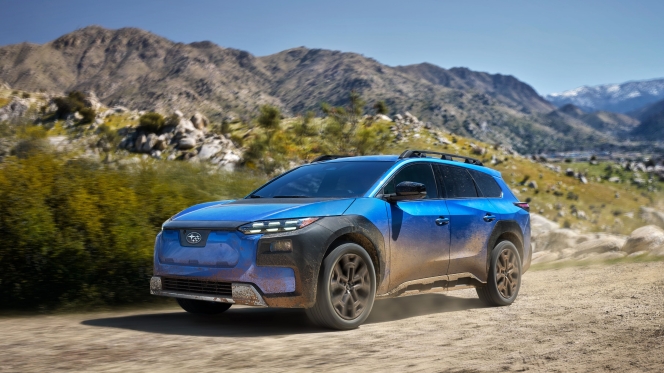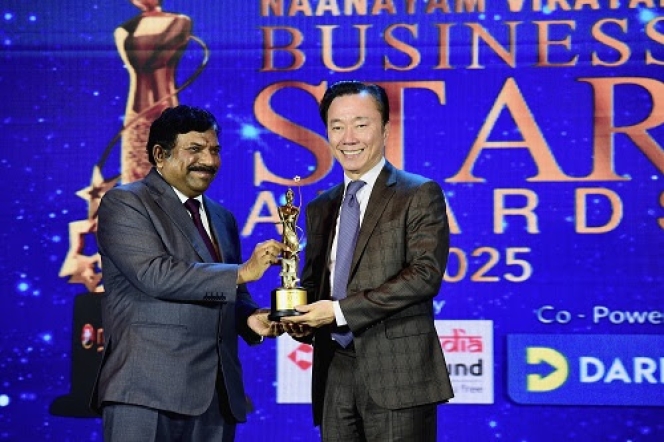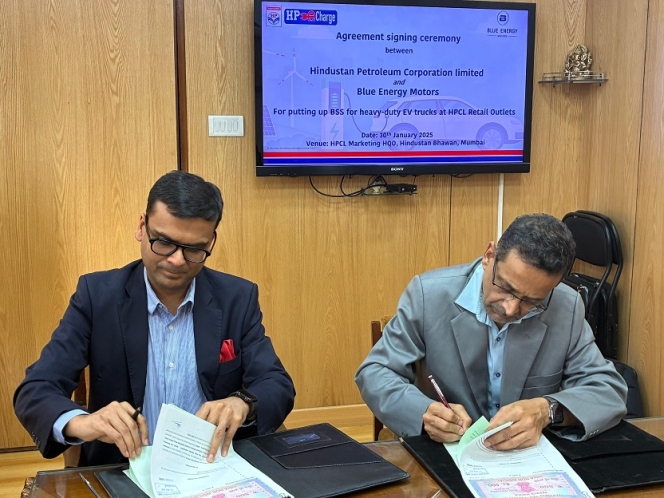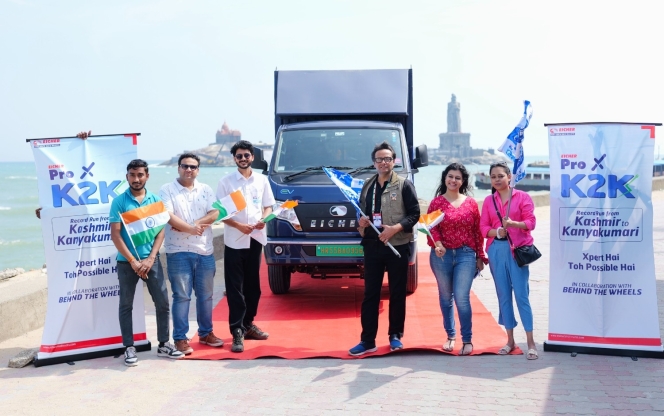Continental Intensifies Climate Change Mitigation Move
- By MT Bureau
- April 28, 2022

With its Net|Zero|Now immediate action programme to mitigate climate change, Continental said it would offer its customers the opportunity to achieve carbon neutrality for their businesses. The company said in a statement that the aim of the programme is to enable customers with ambitious sustainability goals to neutralise the currently remaining “carbon backpack” of their relevant business with Continental.
This carbon backpack includes all emissions generated by processes at Continental and its suppliers as well as following end of use, but does not include the customer’s use phase and emissions.
The carbon backpack is offset by an equal quantity of so-called negative emissions. Net|Zero|Now complements the reduction measures implemented by the company to date and sustainable innovations such as the Conti GreenConcept tyre, which are designed to achieve carbon neutrality in line with the Paris climate agreement, the release said.
The focus of Net|Zero|Now is on Continental products and systems used in emission-free vehicles – from electric cars to hydrogen-powered buses and streetcars, it said.
Continental generated sales of almost EUR 1 billion with emission-free mobility in the past fiscal year. The company said the 10 highest-volume electric vehicle brands worldwide in 2021 all placed their trust in Continental technology. The programme means that for these vehicles, zero-emission mobility is already possible when it comes to the share of CO2 emissions attributable to Continental. Not only are they emission-free during their use, but the value chain relating to Continental is also carbon-neutral, it pointed out.
Besides, Net|Zero|Now will be immediately available for the combustion-engine-vehicle and industrial business, thus helping companies meet the increasingly ambitious carbon neutrality targets on the market, it said.
Dr. Ariane Reinhart, Executive Board member for Human Relations and Sustainability at Continental, said, “2021 in particular, with its devastating floods and forest fires, showed that climate change mitigation needs to be accelerated. We must use every means available to implement measures faster. At the same time, we must seize the opportunities associated with this transformation together with our partners.”
Continental said it sees Net|Zero|Now as an important blueprint for other companies to better achieve the goals of the 2015 Paris climate agreement alongside ambitious reduction efforts and neutralisation measures.
Reinhart added, “Reaching net zero is the benchmark here. And for that, we need appropriate economic incentives as well as more courage. To date, for example, carbon neutrality has not been taken into account in the VAT rate.”
Continental said its approach with its immediate action programme for climate change mitigation relies on the principle of negative emissions and therefore goes beyond conventional carbon offsetting. In mathematical terms, this means that no more emissions are generated for each product in the supply chain than are removed again from the atmosphere, for example through reforestation. On balance, net zero is thus achieved and there is no longer any burden on the climate. The Intergovernmental Panel on Climate Change, which focuses on accelerating carbon dioxide reductions, is increasingly recommending negative emissions in order to meet the goals of the Paris climate agreement.
Continental said it has been working with recognised partners on high-quality and certified ecosystem restoration and reforestation projects to remove the appropriate quantities of CO2 from the atmosphere. Social aspects, the sustainability of reductions, such as safeguards in the event of forest fires, and other quality criteria also play an important role in the selection process, it pointed out.
The company’s sustainability ambition comprises four focus areas: carbon neutrality along Continental’s entire value chain, emission-free mobility and industry, a circular economy and responsible value chains. Continental aims to fulfill its ambition by 2050 at the latest.
Dr. Steffen Schwartz-Höfler, head of Sustainability at Continental, said, “The path to carbon-neutral mobility is both a marathon and numerous sprints. The actual reduction of emissions and our Net|Zero|Now neutralization measures are important complements to our goal of becoming carbon-neutral. Only with this combination can we successfully drive forward the transformation to a sustainable economy with the necessary speed.” (MT)
Subaru Begins Production Of BEVs At Upgraded Gunma Yajima Plant
- By MT Bureau
- February 04, 2026

Marking a significant step in its electrification strategy, Subaru Corporation has initiated domestic production of Battery Electric Vehicles at its Gunma Yajima Plant. This launch coincides with the finalisation of extensive upgrades to the plant’s production systems, a project commenced in August 2025. Central to these enhancements is a new, flexible assembly line engineered to manufacture the all-new E-Outback alongside traditional petrol and hybrid models within a single, integrated process. This approach leverages Subaru's established expertise in mixed-model production, allowing the company to adapt efficiently to the evolving automotive landscape.
The E-Outback itself represents a key milestone as Subaru's second global BEV, developed through a longstanding alliance with Toyota Motor Corporation. This partnership, celebrating its twentieth anniversary in 2025, has grown to encompass collaborative efforts in development, production and supply chain management. The recent manufacturing advancements are a direct result of deepened cooperation in electrification technologies, combined with continuous refinement of Subaru’s own manufacturing, or monozukuri, capabilities.
Looking forward, Subaru intends to further increase manufacturing flexibility. This focus aims to achieve greater production efficiency and development agility, thereby strengthening the company's ability to respond to market shifts and bolster its overall competitiveness. The Subaru E-Outback is scheduled for introduction in the United Kingdom during Summer 2026, with full specifications to be disclosed nearer the launch date.
- VinFast
- Investor of the Year
- Urban Electric Vehicle of the Year
- VinFast VF 7
- Motor Vikatan Awards 2026
VinFast Wins Dual Honours In India For Investment And Electric SUV
- By MT Bureau
- January 31, 2026

VinFast’s strategic progress in India has been further validated through recent accolades from the influential Vikatan Group media network. The company was distinguished with two significant awards: one recognising its substantial investment commitment, and the other honouring its VF 7 model as the premier urban electric vehicle for 2026. These commendations underscore the brand’s deepening integration into the Indian automotive sector, highlighting both its industrial strategy and its product relevance.
The title of Investor of the Year, conferred by Nanayam Vikatan business magazine, specifically acknowledges VinFast’s landmark commitment to establishing an electric vehicle manufacturing facility in Thoothukudi, Tamil Nadu. This project is noted not only for its scale and strategic clarity but also for its anticipated role in fostering a new industrial corridor, generating employment and bolstering the local supplier network. It aligns with national initiatives like Make in India and reflects confidence in the region’s manufacturing potential.
Concurrently, the VF 7 electric SUV was named Urban Electric Vehicle of the Year at the Motor Vikatan Awards 2026. This recognition from automotive experts underscores the model’s successful adaptation to India’s urban driving conditions, balancing design, performance, safety and comfort. It serves as a testament to VinFast’s product development focus and its localisation strategy aimed at meeting specific market demands.
As a respected media institution in South India with a legacy dating to 1926, the Vikatan Group’s awards carry considerable weight among businesses and consumers. These latest honours add to a growing list of VinFast’s achievements in the market, illustrating the convergence of its investment, manufacturing, and product efforts. Within a short timeframe, the company has employed a long-term strategy encompassing manufacturing, retail, charging infrastructure and after-sales services. Through this comprehensive approach and a focus on sustainable innovation, VinFast is steadily building its brand presence while contributing to India’s transition towards green mobility.
Pham Sanh Chau, CEO, VinFast Asia, said, “Being recognised in two important award categories demonstrates how VinFast is steadily building its position in India, not only through long term investment commitments but also through products developed to match local conditions and user needs. This recognition provides further momentum for us to accelerate implementation, expand the electric vehicle ecosystem, and maintain a long-term partnership with the Indian market.”
B Srinivasan, CEO, Vikatan Group, said, “VinFast India represents the new-age investor – bold in vision, swift in execution and deeply aligned with India’s growth story. By unravelling the true potential of the port city of Thoothukudi, VinFast India has helped create a conducive industrial ecosystem, played a positive role in employment generation and restored the city’s importance on India’s manufacturing map. Their investment is not just capital at work but confidence in India’s future.”
Blue Energy Motors And HPCL Forge Nationwide Pact For Electric Truck Battery Swapping
- By MT Bureau
- January 30, 2026

Blue Energy Motors and Hindustan Petroleum Corporation Limited (HPCL) have entered a strategic partnership to deploy Battery Swapping Stations for electric commercial trucks at select HPCL fuel outlets nationwide. This initiative leverages HPCL’s extensive network of over 24,400 retail locations to create a widespread and convenient energy infrastructure for freight operators. By situating swap stations within established fuelling hubs, the collaboration seeks to make electric mobility a practical and scalable reality for India’s logistics sector.
The core advantage of battery swapping lies in its dramatic reduction of energy replenishment time to under five minutes, minimising vehicle downtime compared to conventional charging. For fleet operators, this efficiency translates into higher vehicle utilisation, improved productivity and more predictable scheduling. Furthermore, a growing and accessible network of swap stations alleviates range anxiety, enabling electric heavy-duty trucks to confidently undertake longer routes and multiple shifts.
As India advances its green transportation goals, this alliance holds significant strategic value. HPCL’s vast retail footprint, which already supports over 5,400 EV charging points under its HP e-Charge brand, offers a ready platform for rapid infrastructure deployment across key freight corridors. Blue Energy Motors, a pioneer in zero-emission freight solutions, brings its expertise in electric commercial vehicles, exemplified by its launch of India’s first electric freight corridor. Together, the companies aim to accelerate electric vehicle adoption by directly addressing the operational needs of commercial fleets, thereby strengthening the long-term development of sustainable freight transport in the country.
- Eicher Trucks and Buses
- VE Commercial Vehicles
- VECV
- India Book of Records
- IBR
- Eicher Pro X
- Vinod Aggarwal
- SS Gill
- Abhishek Chaudhary
Eicher Pro X EV Completes Kashmir To Kanyakumari Journey In 6 Days
- By MT Bureau
- January 28, 2026

Eicher Trucks and Buses, part of VE Commercial Vehicles (VECV), has completed a journey from Kashmir to Kanyakumari using its Eicher Pro X EV.
The record verified by the India Book of Records (IBR), saw the electric vehicle cover over 4,000 kilometres in 6 days under loaded conditions. The run commenced in Srinagar on 20 January 2026 and concluded in Kanyakumari on 26 January 2026, traversing the Himalayas, plains and the Deccan Plateau.
Throughout the expedition, the vehicle utilised public chargers located via the MyEicher App. An adjudicator from the India Book of Records accompanied the truck to monitor route compliance, load, distance and charging stops. The mission served as a demonstration of electric vehicle endurance across diverse altitudes and climates to validate the technology for logistics corridors.
The journey was intended to show that electric commercial vehicles can operate beyond short-haul deliveries. By maintaining performance across hilly and coastal routes, the Pro X EV aimed to establish total cost of ownership (TCO) benefits and maintenance predictability for fleet operators. The successful completion of the route suggests that current charging infrastructure can support long-haul electric freight movement.
Vinod Aggarwal, MD & CEO, VE Commercial Vehicles, said, “For more than four decades, Eicher trucks and Buses have earned customer trust through leadership in fuel efficiency and application-specific engineering. The record-setting performance of the Eicher Pro X reinforces our unwavering focus on application excellence, reliability, and performance, anchored in robust product development and manufacturing capabilities, and enabled by a customer-centric, pan-India commercial and dealer network. I commend the entire Eicher team for achieving these well-deserved records”.
SS Gill, Chief Commercial Officer, VE Commercial Vehicles, said, “By covering the K2K route with a loaded Pro X EV, Eicher Trucks & Buses has proven that electric mobility is no longer restricted to short-haul, ‘last-mile’ deliveries. We are not just setting records, but through the strength of our service network and extensive dealer set-up, we are demonstrating that our EV technology is commercially viable, reliable, and has the range to serve as the backbone of India’s green logistics corridors”.
Abhishek Chaudhary, SVP – SCV Sales & Marketing, VE Commercial Vehicles, said, “The Eicher Pro X EV was put to the ultimate test – covering over 4000 kilometres across diverse climates and challenging altitudes. With this recognition from the India Book of Records we’ve moved beyond our own stringent testing benchmarks to real-world validation - Demonstrating that Eicher Pro X EV is a dependable partner for logistics movement across varied operations in India”.








Comments (0)
ADD COMMENT